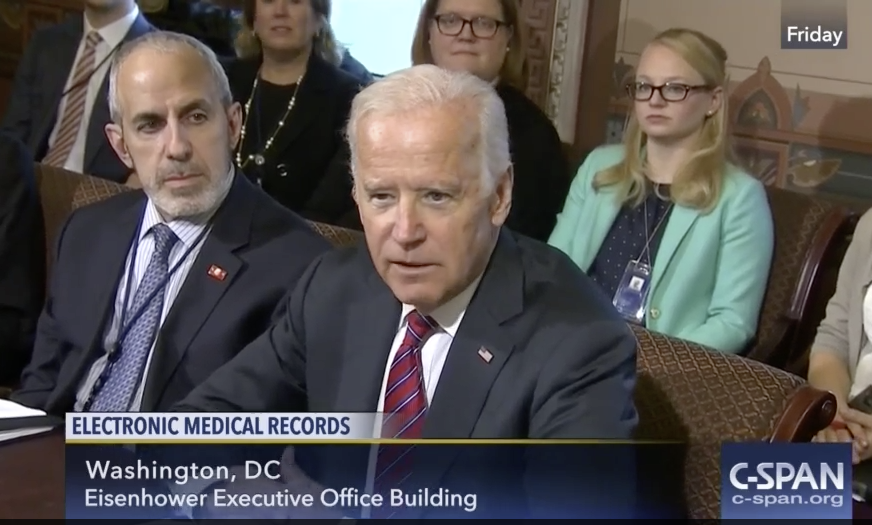Donald Trump
See the following -
Hurricanes Harvey and Irma Draw the Line - Time for the US to Embrace Open Source Emergency and Disaster Response
 For nearly 20 years now the global open source community and applications have been a keystone to disaster relief efforts around the world. The enormous number of disaster relief applications and knowledge that has been developed through all these years, should, and needs to be leveraged in the current crisis. For that reason, Open Health News is starting a series of articles to highlight some of the most important solutions. A substantial portion the open source applications for emergency and disaster response that exist are actually already on the news website in the form of articles and resource pages.
For nearly 20 years now the global open source community and applications have been a keystone to disaster relief efforts around the world. The enormous number of disaster relief applications and knowledge that has been developed through all these years, should, and needs to be leveraged in the current crisis. For that reason, Open Health News is starting a series of articles to highlight some of the most important solutions. A substantial portion the open source applications for emergency and disaster response that exist are actually already on the news website in the form of articles and resource pages.
- The Future Is Open
- Login to post comments
Is Cloud Faxing the Solution to the Health IT Usability and Interoperability Crisis?
 The Healthcare industry is in profound crisis as the HITECH Act of 2009 led medical facilities across the United States to spend in excess of $3 trillion on the purchase and implementation of expensive electronic health records (EHRs) under the Meaningful Use program. Yet, the most fundamental goals of electronic records Nirvana that were promised have not been achieved. For multiple reasons, EHRs have turned out to lack usability and be non-interoperable. In fact, most monopoly EHR vendors are engaged in what is commonly called “data blocking.” In most cases physicians are unable to obtain medical records for the patients they are seeing and patients have a hard time getting a hold of their own medical records. That means that the medical records are not available at the most important moment, the caregiver/patient encounter, and are not available to the patients themselves and their family members.
The Healthcare industry is in profound crisis as the HITECH Act of 2009 led medical facilities across the United States to spend in excess of $3 trillion on the purchase and implementation of expensive electronic health records (EHRs) under the Meaningful Use program. Yet, the most fundamental goals of electronic records Nirvana that were promised have not been achieved. For multiple reasons, EHRs have turned out to lack usability and be non-interoperable. In fact, most monopoly EHR vendors are engaged in what is commonly called “data blocking.” In most cases physicians are unable to obtain medical records for the patients they are seeing and patients have a hard time getting a hold of their own medical records. That means that the medical records are not available at the most important moment, the caregiver/patient encounter, and are not available to the patients themselves and their family members.
- The Future Is Open
- Login to post comments
Is The 1.5+ Trillion Dollar HITECH Act a Failure?
 Hopefully, the public statements made by President Obama and Vice President Biden will lead to a public debate over the monumental problems that the HITECH Act and proprietary EHR vendors have caused the American people. While the press continues to report the figure of $35 billion as the cost of implementing EHRs, that figure does not tell the entire story. Perhaps the next step is to provide accountability and transparency. That would start with firm numbers regarding the real costs of EHR implementations forced on an unprepared healthcare system by the HITECH Act.
Hopefully, the public statements made by President Obama and Vice President Biden will lead to a public debate over the monumental problems that the HITECH Act and proprietary EHR vendors have caused the American people. While the press continues to report the figure of $35 billion as the cost of implementing EHRs, that figure does not tell the entire story. Perhaps the next step is to provide accountability and transparency. That would start with firm numbers regarding the real costs of EHR implementations forced on an unprepared healthcare system by the HITECH Act.
- The Future Is Open
- Login to post comments
Medicity's CEO's Thoughts on Interoperability
 Last week I had the esteemed privilege of attending the EHR Interoperability Meeting at the White House with Seema Verma, CMS Administrator, and Don Rucker MD, National Coordinator at ONC. The attendees represented payer organizations, and the discussion was focused on the barriers to interoperability and how we can band together to overcome them. Below are my responses to the major questions asked of each payer. As you read through this information, I hope it further clarifies our position on these topics.
Last week I had the esteemed privilege of attending the EHR Interoperability Meeting at the White House with Seema Verma, CMS Administrator, and Don Rucker MD, National Coordinator at ONC. The attendees represented payer organizations, and the discussion was focused on the barriers to interoperability and how we can band together to overcome them. Below are my responses to the major questions asked of each payer. As you read through this information, I hope it further clarifies our position on these topics.
- Login to post comments
National Biodefense Strategy: Protecting the Nation Against all Biological Threats
 Today, the White House and four federal departments unveiled a comprehensive National Biodefense Strategy to make America safer against modern biological threats to the United States. In the 21st century, biological threats are increasingly complex and dangerous, and that demands that we act with urgency and singular effort to save lives and protect Americans. Whether a natural outbreak, an accidental release, or a deliberate attack, biological threats are among the most serious we face, with the potential for significant health, economic and national security impacts. Therefore, promoting our health security is a national security imperative.
Today, the White House and four federal departments unveiled a comprehensive National Biodefense Strategy to make America safer against modern biological threats to the United States. In the 21st century, biological threats are increasingly complex and dangerous, and that demands that we act with urgency and singular effort to save lives and protect Americans. Whether a natural outbreak, an accidental release, or a deliberate attack, biological threats are among the most serious we face, with the potential for significant health, economic and national security impacts. Therefore, promoting our health security is a national security imperative.
- Login to post comments
Obama and Biden Blast EHR Vendors for Data Blocking
 As they are winding their terms in office, President Barack Obama and Vice President Joe Biden dropped a stink bomb on the health IT industry. Speaking at different events on Friday, January 9th, the President and Vice President both criticized proprietary electronic health record (EHR) vendors as the primary obstacle to the success of their administration’s health care strategy. This is the highest level acknowledgment so far of the serious impact that “lock-in” EHR software vendors are having on America’s medical infrastructure and the ability of physicians to provide medical care.
As they are winding their terms in office, President Barack Obama and Vice President Joe Biden dropped a stink bomb on the health IT industry. Speaking at different events on Friday, January 9th, the President and Vice President both criticized proprietary electronic health record (EHR) vendors as the primary obstacle to the success of their administration’s health care strategy. This is the highest level acknowledgment so far of the serious impact that “lock-in” EHR software vendors are having on America’s medical infrastructure and the ability of physicians to provide medical care.
Opinion: The US Needs to Invest Foreign Aid Dollars in Smaller NGOs
Last month, U.S. Republican congressional House members released a budget that proposes a gradual reduction in spending on domestic programs and foreign aid from $511 billion to $424 billion through 2027. This is marginally better for global health programs that aid poor countries compared to President Donald Trump’s 2018 proposed budget, which calls for cutting about 32 percent from foreign aid budgets, or nearly $19 billion in total...
- Login to post comments
Pandemic and all-hazards preparedness, response law emboldens U.S. disaster recovery efforts
 The Pandemic and All-Hazards Preparedness and Advancing (PAHPA) Innovation Act, S. 1379, became law on Monday with the president's signature, prompting accolades from national stakeholders, company executives and federal lawmakers. The far-reaching law ensures the United States will be better prepared to respond to a wide range of public health emergencies, whether man-made or occurring through a natural disaster or infectious disease. Overall, the law aims to bolster the nation's health security strategy, strengthen the country's emergency response workforce, prioritize a threat-based approach, and increase communication across the advanced research and development of medical countermeasures (MCMs), among numerous provisions contained in the law.
The Pandemic and All-Hazards Preparedness and Advancing (PAHPA) Innovation Act, S. 1379, became law on Monday with the president's signature, prompting accolades from national stakeholders, company executives and federal lawmakers. The far-reaching law ensures the United States will be better prepared to respond to a wide range of public health emergencies, whether man-made or occurring through a natural disaster or infectious disease. Overall, the law aims to bolster the nation's health security strategy, strengthen the country's emergency response workforce, prioritize a threat-based approach, and increase communication across the advanced research and development of medical countermeasures (MCMs), among numerous provisions contained in the law.
- Login to post comments
Puerto Rico’s Double Whammy: Irma and Hedge Funds
Irma, the largest Atlantic hurricane in recorded history, has proven cruelly fickle as it surges through the Caribbean. The Category Five storm “hit like a bomb” on the small islands of Barbuda and St. Martin, destroying up to 95 percent of the structures and rendering the areas “barely habitable.” But Irma stayed north of Puerto Rico, sparing the island from the worst. That’s not to say that Puerto Rico didn’t sustain damage...
- Login to post comments
Roots of Trump’s ‘Economic Nationalism’
With most of the media and political commentators focused on the Republicans’ failed attempt to pass a healthcare bill, some of President Donald Trump’s most significant words appear to have gone almost unnoticed. The President was away from the political fight in Washington on March 20, conducting one of his periodic attempts to sustain excitement among his base. At a rally in Louisville, Kentucky, Trump repeated his standard lines about putting America first, starting with economic policy....
- Login to post comments
Rural America Is the New ‘Inner City’
At the corner where East North Street meets North Cherry Street in the small Ohio town of Kenton, the Immaculate Conception Church keeps a handwritten record of major ceremonies. Over the last decade, according to these sacramental registries, the church has held twice as many funerals as baptisms. In tiny communities like Kenton, an unprecedented shift is under way. Federal and other data show that in 2013, in the majority of sparsely populated U.S. counties, more people died than were born—the first time that’s happened since the dawn of universal birth registration in the 1930s...
- Login to post comments
Security Experts Warn Congress That the Internet of Things Could Kill People
 A growing mass of poorly secured devices on the Internet of things represents a serious risk to life and property, and the government must intervene to mitigate it. That’s essentially the message that prominent computer security experts recently delivered to Congress. The huge denial-of-service attack in October that crippled the Internet infrastructure provider Dyn and knocked out much of the Web for users in the eastern United States was “benign,” Bruce Schneier, a renowned security scholar and lecturer on public policy at Harvard, said during a hearing last month held by the House Energy and Commerce Committee...
A growing mass of poorly secured devices on the Internet of things represents a serious risk to life and property, and the government must intervene to mitigate it. That’s essentially the message that prominent computer security experts recently delivered to Congress. The huge denial-of-service attack in October that crippled the Internet infrastructure provider Dyn and knocked out much of the Web for users in the eastern United States was “benign,” Bruce Schneier, a renowned security scholar and lecturer on public policy at Harvard, said during a hearing last month held by the House Energy and Commerce Committee...
- Login to post comments
The $100,000-Per-Year Pill: How US Health Agencies Choose Pharma Over Patients
Don Reichmuth survived prostate cancer once before, back in 2007, so his physician was concerned when tests recently revealed the cancer had returned. Reichmuth's physician prescribed a drug called enzalutamide, marketed by the Japanese company Astellas Pharma, Inc. under the brand name Xtandi. But when the physician sent the prescription to the pharmacy, the managers of Reichmuth's insurance plan sent back an immediate refusal to approve it. Reichmuth, a retired teacher who lives in Washington State, was puzzled by the logic. Then he learned the price of the Xtandi prescription: over $9,700 each month...
- Login to post comments
The Fax of Life
When you walk into the Arlington Women’s Center, you see a spacious waiting room with artwork on the wall, maroon chairs, and a friendly receptionist sitting at the front desk. The obstetrics and gynecology practice serves a high-income suburb of Washington, DC. Framed photographs on the wall advertise the center’s physicians who’ve made lists of the city’s best doctors. It’s a modern, upscale doctor office. But when it needs to share patient records, it turns to an outdated technology: the fax machine...
- Login to post comments
The First Count of Fentanyl Deaths in 2016: Up 540% in Three Years
Drug overdoses killed roughly 64,000 people in the United States last year, according to the first governmental account of nationwide drug deaths to cover all of 2016. It’s a staggering rise of more than 22 percent over the 52,404 drug deaths recorded the previous year — and even higher than The New York Times’s estimate in June, which was based on earlier preliminary data. Drug overdoses are expected to remain the leading cause of death for Americans under 50, as synthetic opioids — primarily fentanyl and its analogues — continue to push the death count higher...
- Login to post comments